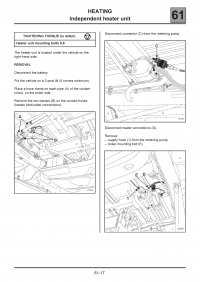In Trafic 2.0 DCI with a mileage of about 420 thousand km, after starting a cold engine, after about 1-2 minutes a characteristic "additional" sound from under the chassis begins to be heard. As if something howled, it whistled and it is not the engine itself. After turning off the engine, you can still hear something spinning and slowing down until it finally goes out (sound a bit like a slowing airplane engine - it whistles less and stops). Since switching off the engine, something howls about 2 minutes and stops. With a warm engine, this is not at all.
I will add that you can feel and see a different smoke balloon under the chassis, a smell definitely different from diesel.
Could it be DPF burning or turbine?
I attach a video with sound where it can be heard well both when the engine is on and when the engine is turned off. (In the movie, I turn off the engine at 27 seconds and then listen for 2 minutes as something goes on and slowly slows down and goes out eventually)
ps computer shows error: Mixture composition sensor circuit. Well, but this does not explain this strange sound ...
[film: b499e1dad6] https://filmy.elektroda.pl/42_1506677689.mp4 [/ film: b499e1dad6] (new video !!!)
I will add that you can feel and see a different smoke balloon under the chassis, a smell definitely different from diesel.
Could it be DPF burning or turbine?
I attach a video with sound where it can be heard well both when the engine is on and when the engine is turned off. (In the movie, I turn off the engine at 27 seconds and then listen for 2 minutes as something goes on and slowly slows down and goes out eventually)
ps computer shows error: Mixture composition sensor circuit. Well, but this does not explain this strange sound ...
[film: b499e1dad6] https://filmy.elektroda.pl/42_1506677689.mp4 [/ film: b499e1dad6] (new video !!!)



